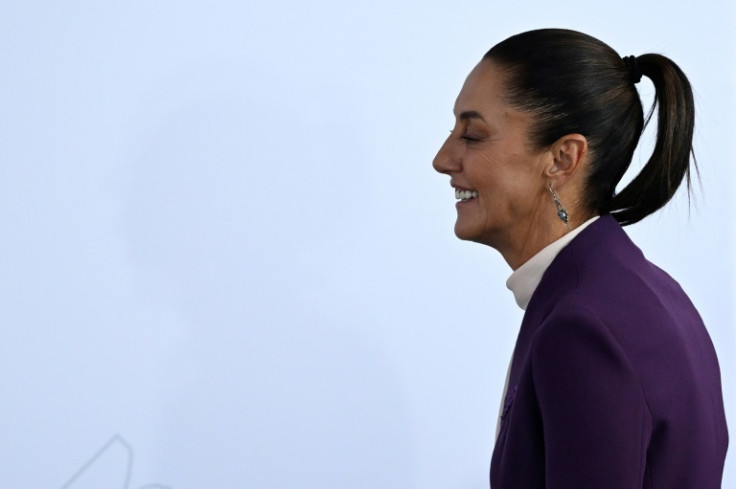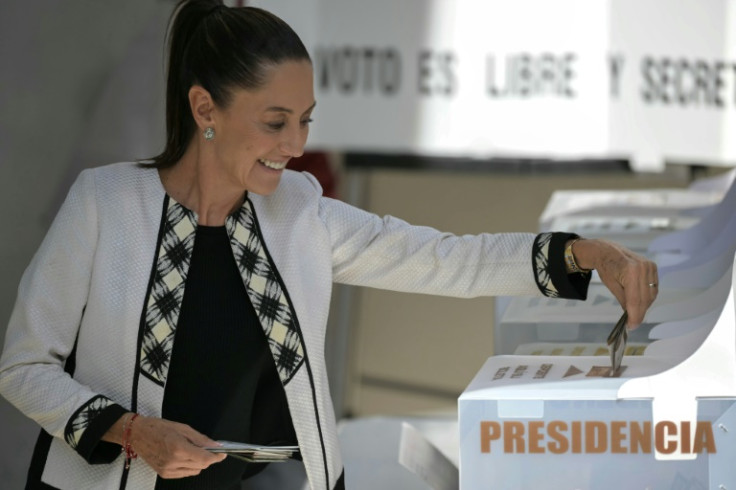Claudia Sheinbaum: Cool-headed Scientist Who Will Lead Mexico

Claudia Sheinbaum, the former city mayor elected Mexico's first woman president, is an environmental scientist and dedicated leftist known for keeping a cool head in times of crisis.
The granddaughter of Bulgarian and Lithuanian Jewish migrants, Sheinbaum is a close ally of outgoing President Andres Manuel Lopez Obrador.
Unlike her mentor, however, the 61-year-old is "not a populist," said Pamela Starr, a professor at the University of Southern California.
"She is much more of a mainstream leftist politician" and likely to be "less ideological" than the outgoing president, she added.
Sheinbaum was born in Mexico City to parents caught up in the turmoil of the early 1960s, when students and other activists were seeking to end the Institutional Revolutionary Party's long grip on power.
"At home, we talked about politics morning, noon and night," she was quoted as saying in a recent biography.
Guillermo Robles, a former classmate at the prestigious National Autonomous University of Mexico, remembers Sheinbaum as a serious student.
"Neither she nor I were that into socializing with everyone," he said.
Sheinbaum's magnetism as a young woman lay in her left-wing political convictions, Robles said.
"She never said 'I can't'. She always went, especially to the rallies," Robles said.
Sheinbaum also spent several years as a researcher in California, where she honed her English language skills.
She was a contributing author of the United Nations' Nobel Peace Prize-winning Intergovernmental Panel on Climate Change.
Her first public role was as Mexico City environment minister in the early 2000s.
Sheinbaum's political career has been marked by controversy and tragedy at times.
In 2017, a powerful earthquake caused a school to collapse in a southern Mexico City district where she was the local mayor, killing 26 people, including 19 children.
Sheinbaum denied that irregularities in the construction were her office's responsibility, and went on to be elected mayor of all of Mexico City the following year.
Her use of scientific methods and technological tools was seen in the Covid-19 pandemic response in the capital, though it did not prevent a high mortality rate.
"She has an impressive capacity for analysis, reading data and finding very practical solutions," said Tatiana Clouthier, a former economy minister who is now a spokesperson for her campaign.
"Despite being a scientist, she is something of a social fighter, which makes a very good combination of heart and mind," Clouthier added.
In 2021, while Sheinbaum was Mexico City mayor, disaster struck again when a section of elevated metro track collapsed, killing 26 people and injuring dozens.
Sheinbaum rejected accusations that budget cuts were to blame.
She negotiated with the construction company owned by magnate Carlos Slim that built the line to obtain compensation for victims and avoid lawsuits.
"Governing is about making decisions. You have to make a decision and assume the pressures that can come from it," Sheinbaum said.
During a series of heated election debates, an unflappable Sheinbaum avoided looking at her main opponent Xochitl Galvez or even calling her by name, despite a barrage of accusations.
Galvez branded Sheinbaum "cold and heartless," saying she lacked sympathy for child cancer patients and earthquake victims.
"I would call you the ice lady," Galvez said.
Sheinbaum has shown a warmer side at times, kissing and hugging supporters, and revealing a nerdy sense of humor in TikTok videos.
She shared videos with the news of her marriage in November 2023 to her university sweetheart, Jesus Tarriba.
Former classmate Robles, who has known Sheinbaum for 37 years, said success had never gone to her head.
"She does have love for Mexico. She's not ambitious like many politicians. Claudia is not even remotely like traditional politicians," he said.


© Copyright AFP 2024. All rights reserved.





















